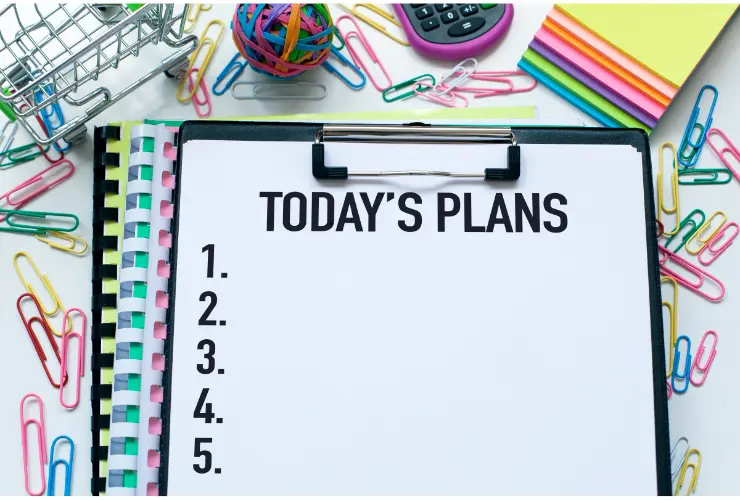How To Plan Your Day: 8 Tips For Effective Daily Planning

Do you ever feel buried under everything you need to get done, wondering how you’ll finish it all?
Here are 8 simple tips on how to plan your day and make daily planning feel less like a chore.
One line I always come back to is, “If you fail to plan, you plan to fail.”
I get it — letting the day unfold naturally has its charm.
But in a world that glorifies being busy and stressed (which makes no sense to me), the people who take control of their time are the ones who actually get to breathe.
The best part about planning ahead is you get to decide how much structure you want.
I know folks who plan out their whole week or even their entire month.
Some even fill up massive planners with every detail of their year.
But for me, the most essential habit — and one I believe everyone needs — is daily planning.
It’s the one thing I never skip because it makes every part of my life easier, whether I’m managing this blog or keeping up with my workouts.
In this post, I’ll walk you through the exact tips I use to plan my day without overcomplicating it.
8 Awesome Tips For Planning Your Day
1. Start the night before
I’ve learned that my mornings go smoother when I take a few minutes the night before to figure out what’s waiting for me.
I sit down with a pen and paper, write down everything I know I need to handle the next day, and even set out my clothes if I can.
This helps me sleep better too because my brain isn’t spinning trying to remember all the things I need to do.
It doesn’t have to be perfect — just a rough idea is better than nothing.
When I wake up, I already feel one step ahead.
2. Write your to-do list on paper
I know people love their apps and calendars, but for me, writing my list by hand keeps me focused.
Something about seeing it on paper feels more real.
I make sure it’s short and realistic because I used to write twenty tasks and feel defeated by noon.
Now, I pick my top 3–5 priorities and put them in order.
This helps me focus on what actually matters instead of just staying busy.
It’s simple and it works.
3. Break your day into chunks
Trying to get through one long block of work never works for me.
So I divide my day into chunks: morning, afternoon, and evening.
In each chunk, I focus on one or two big things instead of juggling everything at once.
This makes my day feel lighter and more manageable.
Even if one part of the day goes sideways, I can reset for the next chunk.
It feels less stressful than staring at a giant list with no structure.
4. Include time for yourself
For a long time, I thought planning my day meant cramming in as much as possible.
But I’ve learned that rest and fun need space on the schedule too.
So I plan little breaks, even if it’s just ten minutes to sit outside or have coffee without my phone.
When I take care of myself during the day, I actually get more done and feel better at the end of it.
You deserve that time, and it’s just as important as any task.
5. Start with the hardest thing
This one took me a while to figure out, but it changed everything.
If I save the hardest task for last, I spend the whole day dreading it.
So now, I try to do it first thing while my energy and focus are high.
It’s not easy at first, but it feels amazing to get it out of the way early.
After that, the rest of the day feels lighter and less stressful.
You might surprise yourself with how much you can get done this way.
6. Leave room for the unexpected
No matter how much I plan, something always comes up that I didn’t expect.
So I don’t pack my day too full.
I leave a little open space between tasks in case a call runs long or something urgent pops up.
It keeps me from feeling completely thrown off when life happens.
Sometimes that open time even turns into a nice break or a moment to catch my breath.
Planning for surprises helps me stay calm when they happen.
7. Check in with yourself during the day
I used to write my list in the morning and then ignore it until bedtime.
Now, I stop a couple of times during the day to see how I’m doing.
If something is taking longer than I thought, I adjust my list.
If I’ve already done my big priorities, I let myself stop early or focus on smaller tasks.
Checking in keeps me honest and helps me stay flexible without feeling like I failed.
It’s just a way to stay on track without being too rigid.
8. End the day with a little reflection
At night, I take a minute to look back at what went well and what didn’t.
I don’t beat myself up if I didn’t finish everything.
Instead, I focus on what I did accomplish and carry anything unfinished to the next day’s list.
This little habit helps me end the day feeling grateful instead of frustrated.
It also gives me a chance to improve my planning for tomorrow.
It feels good to know I’m learning and getting better at this over time.
One last thought…
Planning your day doesn’t need to be fancy or perfect.
It’s just about making small choices to take charge of your time instead of letting it control you.
These steps work for me because they’re simple, realistic, and easy to stick with.
If you’ve been feeling overwhelmed, start with just one of these tips and build from there.
You might find that planning your day gives you more freedom, not less.
And that’s what makes it worth it.





